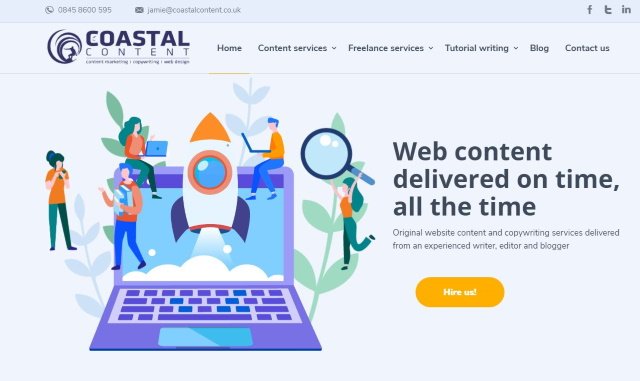Ten things every small business website needs

Here at Coastal Content, we build quite a few small business websites. Some are just so people can find the phone number or email address of the company while others are to showcase products and services. A few go a little further and actively engage their customers directly through the site or through social media.
So what does a small business website need to be effective? What elements are necessary to provide real benefit to the owner? Here is what I think are the ten things every successful small business website needs.
1. A clear description of the business
It should be obvious from within a couple of seconds of landing on any page of the website who the company is and what they do. Visitors should never have to guess, search or hunt for an idea of what they are looking at.
Visitors won?t always arrive at the home page, so each and every page should be designed to be clear, concise and descriptive.
2. Contact details
If a visitor has found you and read about what you offer, they will next (hopefully) want to contact you. Having a phone number and email address prominent on every page is vital. WordPress offers sticky menus that stay on the top of the page even as you scroll, these are great for keeping contact details in sight.
A landline or Freephone number looks much more professional than a mobile. You can always have a Freephone divert to a mobile without the caller knowing. A company email address is important too. Freemail addresses such as Gmail or Outlook do not have the same professional impact as a company one.
3. Good domain name
An often overlooked aspect of many small business websites is the domain name. It should contain the company name and end in .com or .co.uk. For non-profits, a .org is okay too. While there are many newer TLDs available, people aren?t yet familiar with them so should be avoided or bought to accompany the main address.
Adding numbers, hyphens or asking for awkward to type web addresses is a definite no-no. It not only make things hard for SEO, visitors will soon tire of typing them.
4. Quality hosting
You could have the best small business website in the world but if you?re using a substandard host, it?s all for naught. Visitors have no patience for slow sites, websites that suffer lots of downtime or are frequently hacked.
Good hosts will ensure there is enough power and bandwidth to deliver a quality experience to every website visitor. If they don?t, change.
5. Security
While invisible to your audience, every single website out there should be secure. Website hacking is a huge problem. Having your website hacked not only disrupts the service you?re offering, it also impacts your reputation. That impact is exacerbated if your site infects visitors with malware.
Here at Coastal Content, we spend as much time securing your website as we do putting it together. After all, if anything happens to the site we build you, it?s both our reputations on the line!
6. Clean design
With the practicalities out of the way, it?s time to talk design. We use WordPress templates, which is how we are so cheap compared to typical web designers. Those templates are carefully selected to be clean, simple to use, nice to look at and reflect the quality of your business.
Beauty is in the eye of the beholder, so you have to look good to the widest range of people. That?s where clean, crisp design comes into its own.
7. Good navigation
Have you ever landed on a website and then not be able to find what you were looking for? Or surfed deep into a website only to not be able to go back to the home page? A good small business website will have simple, clear navigation that gets the visitor where they want to go in no more than three clicks.
Drop down menus or sidebar navigation are two tricks we use to ensure visitors always know where they are and where they can go.
8. Quality web content
As well as a clear description of what you do and what you offer, great supporting content is also needed to tell your story. The site content needs to fulfil the needs of the business, the needs of the audience and SEO. It needs to satisfy all three at once without compromising one another. Writing web content might seem easy but there is a lot more to it than you might think!
Each page should have at least one call to action. Well-crafted calls will spur the reader into doing what you want them to do, whether that?s to call you, email you or buy something.
9. Interaction
While you can certainly buy a website, make it live and leave it to do its work, it will perform much better with a little love and attention. While purely optional, having a social element to your website and actively interacting with your audience is a great way to build loyalty and engage with new customers.
Much depends on what you need and what business you?re in, but if it could work for you, it is well worth the investment in your time.
10. Fresh content
Google loves fresh content. Your audience loves fresh content. We all love fresh content. A blog is just one way to add fresh and interesting stuff for people and search engines to read. It?s a way of engaging with your audience, of building a picture of your business, showcasing new developments or telling your story.
Blogs aren?t the only way to get new content. You can also publish white papers, case studies, analyses, opinion pieces and more.
If you?re looking for a small business website that delivers all these things in a very cost-effective package, contact Coastal Content today. We take care of everything so you don?t have to!



